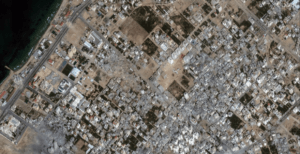Shocking NASA Images Reveal Gaza Plunged into Darkness Amid Israeli Power Cuts
NASA satellite images reveal Gaza plunged into darkness due to Israeli power and fuel restrictions, worsening an already dire humanitarian crisis. Electricity shortages have left millions with little to no power, severely impacting daily life. Hospitals are struggling to keep critical equipment running as backup generators run low on fuel, while water pumping and purification systems are failing, deepening the water crisis. Food storage and communication have been disrupted, further aggravating conditions.
Aid organizations warn of a public health disaster due to worsening sanitation and water shortages. The UN and human rights groups have condemned the restrictions as collective punishment, while international pressure mounts on Israel to restore essential services. However, Israel defends its actions, citing security concerns over the potential misuse of resources by militant groups. Calls for a ceasefire and humanitarian aid continue, but political solutions remain elusive. As global appeals for intervention grow, the worsening conditions underscore the urgent need for humanitarian relief and a lasting resolution to the crisis.

Shocking NASA Images Reveal Gaza Plunged into Darkness Amid Israeli Power Cuts
New NASA satellite photos show Gaza plunged into darkness as Israel’s restrictions on electricity and fuel take a heavy toll. The images highlight a severe power crisis in the densely populated region, with most areas appearing much darker compared to earlier photos.
Life Without Power
Even before the recent conflict, Gaza faced frequent blackouts due to political and economic issues. The area’s 2 million residents relied on limited electricity from Israel, a local power plant, and Egypt. However, since the conflict escalated, Israel has completely cut off power and fuel, leaving many without electricity for hours—or even days.
The photos starkly contrast Gaza with nearby Israeli and West Bank cities, which remain brightly lit. The blackout has disrupted daily life: families cannot light their homes, refrigerate food, or charge phones. Hospitals are in crisis, struggling to power essential equipment like incubators and dialysis machines. Backup generators are running out of fuel, and clean water is scarce because pumps and treatment plants require electricity.
Growing Humanitarian Disaster
The power cuts have worsened Gaza’s already dire situation. Hospitals warn they may soon be unable to treat patients. Water shortages increase the risk of disease outbreaks, and without refrigeration, food is spoiling. Communication networks are failing, cutting people off from vital updates. Most businesses and services have shut down, deepening the economic collapse.
Global Calls for Help
The images have sparked international alarm. The UN and aid groups urge Israel to restore power and fuel, calling the cuts “collective punishment”—a violation of international law. UN Secretary-General António Guterres warned that cutting essential services like power, water, and food could have devastating consequences for civilians. Countries such as the U.S. and EU members are pushing for urgent humanitarian aid, but Israel maintains the blockade, citing security risks.
Israel’s Stance
Israel argues that the restrictions prevent militant groups from using fuel for attacks. Officials claim that aid could be diverted for military purposes and insist that easing restrictions depends on security negotiations. Critics, however, argue that the policy primarily harms civilians and that safeguards could be implemented to ensure aid reaches hospitals and water facilities.
What’s Next?
As Gaza’s crisis deepens, the world faces increasing pressure to act. Talks of ceasefires, humanitarian aid access, and long-term solutions continue, but progress remains slow. The satellite photos underscore the urgency: Gaza’s people remain trapped in darkness, struggling without electricity, clean water, or medical care, as hospitals near collapse and food supplies dwindle, waiting for relief amid a worsening humanitarian catastrophe.
You must be logged in to post a comment.